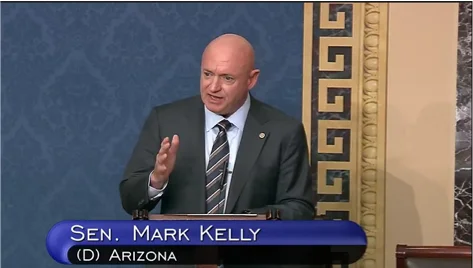WATCH: Kelly Speaks on Senate Floor Immediately After His Microchip Manufacturing Bill Passes Senate
To download the video file, click HERE
Today, Arizona Senator Mark Kelly spoke on the Senate floor immediately following the passage of the CHIPS Act of 2022, microchip manufacturing legislation that he has championed for over a year. In his speech, Kelly touted the benefits of the bill, including strengthening supply chains to lower costs, making America more competitive in the global marketplace, and creating great-paying jobs in Arizona.
“While this process has been long, it has also shown what we can accomplish when we work together, Republicans and Democrats,” said Senator Kelly during his speech. “And as a result, our country is going to once again be a leader in microchip manufacturing, creating tens of thousands of great paying jobs, strengthening our national security, and lowering costs for everyday products.”
Kelly was the lead negotiator of the bipartisan agreement to invest $52 billion in the semiconductor industry, was an original co-sponsor of the U.S. Innovation and Competition Act, and crafted the FABS Act, three pieces of legislation that form the backbone of the bill.
Watch the video HERE. To download the video file, click HERE. Read a transcript of Kelly’s remarks below:
Just a few minutes ago, after a year and a half of work, we have finally, finally passed our plan to boost microchip manufacturing in the United States.
Microchips go in nearly everything we use. They are in the TV or the cell phone that folks are watching this on. And they are in lifesaving medical devices. And they are in our most advanced weapons systems.
The United States invented microchips and once, we produced forty percent of the world’s supply. Today, we only produce about twelve percent. And we don’t produce any of the most advanced microchips. Now that leaves us vulnerable to disruptions in the supply chain, like the current microchip shortage that has halted production lines and driven up prices. If you’ve recently tried to buy a car, a new car, and waited months, or paid more than you were expecting, the microchip shortage is a big reason why.
So, we’ve worked on a plan, Republicans and Democrats, with incentives to make sure the world’s leading microchip manufacturers grow their operations here in the United States, instead of China or Europe. It also boosts research so that the most advanced chips in the world are invented and produced right here in the United States.
That will mean tens of thousands of new jobs in places like Arizona, which is already a microchip hub poised to grow as Intel and the Taiwan Semiconductor Manufacturing Company expand and build new manufacturing facilities. That is all made possible by this legislation, and it creates jobs not just with those companies, but also with the companies that supply them the tools and packaging for their products. And these are great-paying jobs. And many of them do not require a four-year degree.
I visited Estrella Mountain Community College just several weeks ago where they are training Arizonans to enter the semiconductor technician career track with just a ten-day course – followed by a guaranteed job interview.
Now this is an enormous opportunity to reinvent our economy for the future. And this week, we’re getting it done.
This bill has now passed the Senate, and I am confident it will pass the House and be signed into law.
And while this process has been long, it has also shown what we can accomplish when we work together, Republicans and Democrats.
Senators Young, Cornyn, Warner, and I first began working on this at the beginning of last year. We found agreement and worked to build support from our colleagues. And since then, we’ve had to overcome more than a few roadblocks. But what matters most is that we got this done.
And as a result, our country is going to once again be a leader in microchip manufacturing, creating tens of thousands of great paying jobs, strengthening our national security, and lowering costs for everyday products. Thank you.

